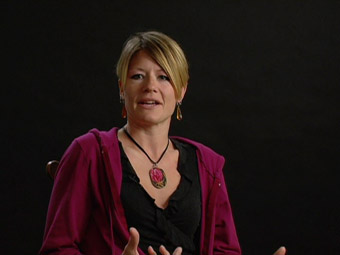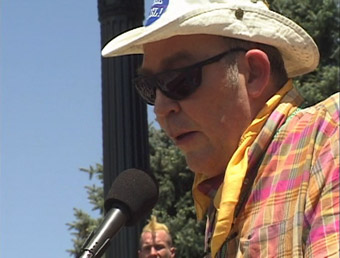|
There
are any number of good reasons for making a documentary
film, but bringing to public attention a possible
miscarriage of justice, where an individual may be facing
a life sentence or worse for crimes they may not have committed,
is definitely one of the best. The wrongful arrest strand of investigative documentary
has as its godfather Errol Morris's mighty and magnificent
The Thin Blue
Line, a film that was at least partly responsible
for freeing Randall Adams from death row, and has a prodigal
son in Joe Berlinger and Bruce Sinofsky's 1996 Paradise
Lost: The Child Murders at Robin Hood Hills,
an extraordinary work that opened an international debate
on the guilt or innocence of its young subjects.
At
first glance, Free Lisl: Fear & Loathing in
Denver is a title that suggests a similar cinematic
campaign for justice, but director Wayne Ewing is up front
about the fact that his subject, Lisl Auman, has already
been freed after serving several years of a life sentence.
His prime objective is to highlight an injustice and the potential
for wilful misinterpretation made possible by an archaic point
of law, and to document the campaign that helped bring the
case to wider public attention and the contribution
of its most renowned participant.

All
of you should know the name of Hunter S. Thompson, and if
not then you should stop reading this and immediately research
the man and his work. Probably his most famous (some might
say notorious) achievement was Fear and Loathing in
Las Vegas, a brilliant, insane, drug-fuelled diary
of his own journalistic adventures in the late 1960s that
for many of us is one of the defining literary works of the modern
age. Thompson's reputation as the wild man of journalism
has followed him since, with the focus always on the wild,
and one of the most pleasing aspects of Ewing's film is
the glimpse it provides of the man behind the media image.
That he is almost the only key participant for the defence
who is not interviewed is due to a tragedy of circumstance,
one that gives Auman's story a sad final twist that
her own participation in this film is clearly designed to at
least partly address.
I
realise that by name-checking two of the best films in this
particular sub-genre I may be creating unfair expectations
for Free Lisl. Auman's case in neither
as complex nor riddled with inconsistencies, contradictory
testimony, legal tomfoolery and outright prejudice as those
of Randall Adams and Damien Echols, although it does have
its share of all of these. The really suspect evidence boils
down to just two testimonies and one alleged action on Auman's
part, and there are no last-minute surprise twists in the
tale to drop the jaw. Structured primarily around a campaign
rally organised for the day of Auman's appeal hearing and
the speeches made in support of her case, this is as much
a record of events as an expose of the misdeeds of those
in authority.
But
it is still a tale worth telling and one that is well told.
Rather than presenting the facts in a linear fashion, Ewing
introduces us first to his central character, then to the
idea that she was unjustly imprisoned, and only later fills in the details
of how she landed in jail facing life without parole and
why the case against her was called into question. This
proves a very effective way of telling a story whose
facts could be effectively covered in about twenty minutes
of screen time, adding as it does an element of intrigue
and mounting disbelief as the story unfolds. The very reason
I have not gone into any detail about Auman's case – all
I'll tell you is that she was convicted aged 21 of the murder
of a Denver police officer, despite being handcuffed in
the back of a police car when the incident occurred – is
because to do so would rob the film of what effectively
amount to its narrative twists, and frankly you'd do better
to hear them from the filmmakers than from me. This is likely
to be especially true for a UK audience, few of whom will
be familiar with the Auman case and the subsequent campaign
to free her.

It
is inevitable that the film should be sold on the involvement
of Hunter S. Thompson, just as his image and name were featured
so prominently in the newspaper reports of the campaign
rally, and it does serve as a fitting tribute to the author's
final battle with the powers that be. But by telling Auman's
story Ewing and his team also highlight an aspect of American
law that, while perhaps well intentioned, is clearly and
worryingly open to misuse, with serious consequences for
anyone caught in its blast. The film also hints at deeper
concerns, arrestingly summed up by Berkeley professor Timothy
Ferris, who suggests that at the present rate of increase,
America will soon have imprisoned an even higher proportion
of its population than either Stalinist Soviet Union or
Apartheid South Africa, a statistic that should rattle even
the most complacent of viewers.
Free
Lisl: Fear and Loathing in Denver makes for involving
and eye-opening viewing and is worth hunting out if you
have an interest in films that explore the justice system
at its shakiest. If I have one complaint it's the presentation
of sideways scrolling textual information at the same time
as sometimes crucial audio. Maybe it's a sign of my slowing
up in the age of information overload, but I more than once
had to pause and rewind to read what I'd missed through
listening, and just as well, as otherwise I would have failed to catch
a key piece of evidence regarding fingerprints (or the lack
of them) that helps make a mockery of the prosecution case.
Shot
on what looks like DigiBeta or equivalent high-band video,
the 4:3 transfer has been made from the video original and
looks close to pristine, being pin sharp with excellent
contrast and faithful colour reproduction. A variety of
source material, including news footage and reports and
police taped interviews (the latter looking like second
generation VHS) are included, and the quality of these is
generally as a good as could be expected.
The
Dolby 2.0 soundtrack is of similarly impressive quality.
The packaging doesn't state whether it's mono or stereo
– I couldn't detect any separation but the clarity of the
recording is excellent, Warren Devon's open-air performance
of Lawyers, Guns & Money sounding almost as if it
was recorded and mixed in a studio. The quality inevitably
drops off a bit in the source material, but this is appropriate
to the material.
Nothing
here.
The
name of Wayne Ewing may not be well known to UK audiences,
but those who know their TV may recognise him as the man
who designed the revolutionary photographic style of Homicide:
Life on the Street, for my money the finest cop
show ever to hit TV screens anywhere. In recent year,s he
has carved out a niche for himself making documentaries
based around the life and activities of Hunter S. Thompson,
with titles that include Hunter Goes to Hollywood
(2003), Breakfast with Hunter (2003) and
When I Die (2005), as well as the investigative
political documentaries Benched:
The Corporate Takeover of the Judiciary and
the Last Campaign
(both 2005), none of which, to my knowledge, have been widely
seen in the UK. Free Lisl suggests that
they deserve to find a wider audience, but tracking them
down is a job for the dedicated – I couldn't find Free
Lisl on any of the usual on-line retailers, including
Amazon, but you can get it directly from Ewing's own site
at www.hunterthompsonfilms.com,
along with Breakfast With Hunter and When
I Die.
|